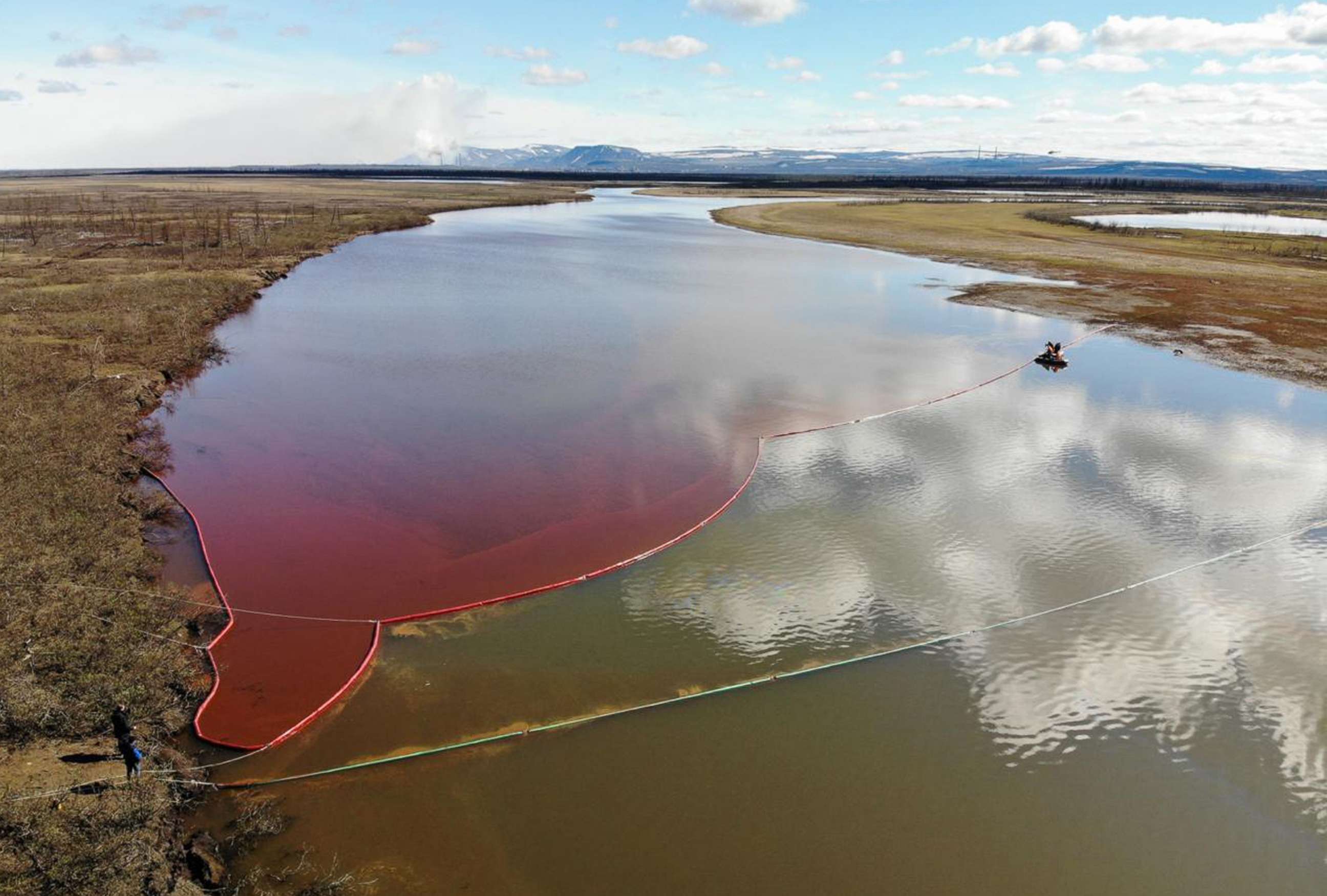Russia declares emergency in Arctic after huge diesel leak turns rivers red
Mining company says permafrost melt caused by climate change may to be blame.
Russian authorities have declared a state of emergency in an Arctic region after a huge fuel tank ruptured and leaked 20,000 tons of diesel into rivers, turning them blood red.
A massive reserve fuel tank belonging to a thermal power station burst on Friday near Norilsk, a remote city in northern Russia about 180 miles above the Arctic Circle.
The tank, in an industrial zone owned by the Russian mining conglomerate Norilsk Nikel, contained around 20,000 tons of diesel, and most of that has leaked into nearby rivers and a reservoir in the Taimyrskii Dolgano-Nenetskii district, according to Russian emergency officials.
Videos and photographs taken from above show show large swathes of two rivers, the Ambarnaya and Daldykan, having turned a bright red. The pollution is so visible that it can be seen in satellite images on Russia's equivalent of Google Maps, Yandex Maps. Environmental campaigners are warning of potential longterm harm to the area.
President Vladimir Putin on Wednesday declared the spill a federal emergency and criticized regional authorities for not responding sooner. The Krasnoyarsk region, which includes Norilsk, announced a local state of emergency on Sunday, two days after the leak occurred.
Officials blamed the delay in reacting to the leak on the local authorities' failure to inform them of the scale of the incident.
Alexander Uss, governor of the Krasnoyarsk region, a massive Siberian territory that includes Norilsk, told Putin in a televised video call on Wednesday that he had only discovered the seriousness of the situation when local people posted videos on social media.
That prompted an unusually irritated response from Putin, who demanded to know why it had taken two days for authorities to learn of the disaster.
"What, we're going to learn about emergency situations from social media now, are we?" Putin told Uss.

When the leak first happened, Krasnoyarsk's emergency ministry told reporters a car had crashed into the fuel tanks, causing a fire, but no major leak was mentioned. It later was discovered that the car had caught fire after it was covered by the huge flood of leaking fuel.
Anatoly Tsykalov, vice president of the Krasnoyarsk regional government, told the Russian news outlet RBC earlier in the week that the environmental damage could have been lessened if local officials told them sooner.
"If the signal had come on time, it would be have been possible to send equipment," Tsykalov told RBC. He said workers could have created a dam on the slopes beneath the tank to prevent the fuel reaching waterways that feed into the larger rivers.
Russia's Prosecutor General's Office on Wednesday said a criminal probe had been opened into possible charges of environmental damage. The director of the power station's turbine section has been detained as a suspect, it said, and its general director has been issued a warning.
The World Wildlife Fund, which helped sound the alarm about the spill, said on Wednesday that workers had now managed to stop the diesel from spreading to a nearby lake by using floating barriers.
But "the successful localization of the slick does not mean that polluting substances haven't got into the lake," Aleksey Knizhnikov, WWF Russia's director for environmentally responsible business, was quoted in a post by the group. He said the most toxic components of diesel fuel dissolve easily in water, meaning barriers can't stop them.
In a video published by local media, a man is seen scooping water out of the polluted river and then lighting it on fire.
"The consequences of such accidents, especially in the north, reverberate for a long time. It means the death of fish, the contamination of birds' feathers and the poisoning of animals," Sergey Verkhovets, WWF Russia's coordinator for arctic projects, said in a separate statement. Indigenous reindeer herders nearby also could suffer greatly.
Russia's minister for emergency services, Yevgeny Zinichyev, told Putin on Wednesday that workers had so far removed 100 tons of fuel and polluted concrete from the area, but that cleaning the polluted waterways would require considerable work. He said 100 more emergency workers would arrive on Thursday to assist. The governor, Uss, said his region had no experience dealing with a leak of such scale.
The leak appears to be one of the most serious environmental accidents in the region in recent years involving Norilsk Nikel, which has been behind previous spills.
The cause of the fuel tank's rupture is still being investigated. Norilsk Nikel has suggested the tank may have collapsed because permafrost beneath it could have thawed after an exceptionally warm winter. Russia saw record warm temperatures this year, and in some regions virtually no snow.
"What we can suggest is that as a result of the abnormally mild temperatures, a melting of the permafrost could have happened that led to the partial subsiding of the support on which the tank sits," Sergey Dyachenko, the company's first vice president, said in a statement.
Melting permafrost has become a significant issue in the region as temperatures warm because of climate change. Many buildings in Norilsk are built without foundations, directly onto the normally rock-hard frozen soil. But in recent years, top layers of the permafrost have thawed, causing buildings to sink or become structurally unsound.
It is not the first time, however, that rivers near Norilsk Nikel's facilities in the area have been severely polluted. In 2016, the company acknowledged that flooding at one of its metal plants near the same area had caused a leak ,which also turned a river bright red. The company had initially denied any involvement in the river's pollution.




